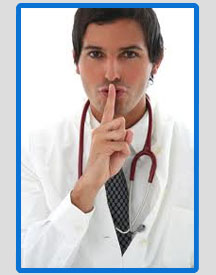
Dear Patients and Friends,
I just finished reading a nice popular article in Reader’s Digest (RD) . RD is both a boon and a bane to our society when it comes to patient advice. It certainly conveys a lot of information efficiently but when complex problems are made too simple the advice becomes erroneous and fraught with misinterpretations. So, the best tactic is to use Reader’s Digest as an “information portal”, a kind of gateway to further study. The information is like an introduction and reading, or worse, judging a book by its introduction only can be dangerous when the information is applied to human care.
Lately, Reader’s Digest has been particularly interested in patient health and welfare and serves as a pretty good information portal for patients. They have a series of articles concerning Secrets They Won’t Tell You. It’s presented as a melodramatic expose but the information itself is merely candid advice we hear and dispense daily. Apparently some doctors are not as candid as we think. so when the information is “revealed” is sounds like some deep, dark secret that is finally “out of the bag.”
The article Secrets Your Hospitals Won’t Tell You,
Secrets Your Dentist Won’t Tell You.
and Secrets Your Nurse Won’t Tell You.
http://www.rd.com/slideshows/50-secrets-your-nurse-wont-tell-you/
are particularly good.
50 Secrets Your Surgeon Won’t Tell You as of Sept, 2012, is not yet on the Internet but it is worth reading on the newsstand. Only 5 items, I believe, are misleading in this particular article:
#23 – “Doctors have an economic incentive to operate”
True: Generally speaking the fees between surgical and non-surgical treatment in medicine and dentistry can indeed be tenfold. However, the cost of repeated non-surgical care that is only temporarily helpful, in the aggregate, over many years can actually exceed the cost of definitive surgery.
However, I understand the prejudice many surgeons have with surgical intervention so our surgical fees and non surgical fees are roughly equivalent. There is no economic incentive to operate in our office. I wish all insurance companies would reimburse doctors performing non-surgical alternative would be justly indemnified. Yet the surgical economic incentive is maintained nationally in all areas of healthcare and it is indeed an unfortunate reality.
#33, 34, 35 -”Doctors have financial incentives to speak on behalf of a product or commercial device”
I have to date four university appointments and I lecture for a number of companies. The honorarium I receive does not allow me a profit and frankly, traveling to another city, lecturing all day and sleeping on a plane back home is not vacation. Yet, occasionally it is professionally gratifying to exchange views with doctors foreign to my immediate colleagues. The reward is professional and emotional, not financial. In fact, factoring opportunity costs into my lecture opportunities makes speaking about a product a net financial loss.
Exception: When the honorarium approaches tens or hundreds of thousands of dollars per year the product/professional conflict of interest becomes real, material and a significant social problem.
#48 “If it ain’t broke, don’t fix it…wait for symptoms”
This is perhaps one of the most dangerous bits of advice the RD editors have rendered. It is true that waiting for signs and symptoms makes one sure that the surgery was necessary. What it ignores of course is those patients who have died because they waited too long – consider strokes and heart attacks. In dentistry, consider pain or loose teeth. When these events occur surely the system is “broken”. But, by that time it is too late. In medicine, one often calls the mortician not the surgeon. Also, even when the surgeon is called, he is treating late stage disease and terminal pathology. Then the objective becomes not definitive cure, but rather symptomatic and palliative, ameliorating the symptoms but not stopping the cause of the problem and certainly not reversing the damage that has occurred because the patient waited too long. A good rule of thumb is to ask, “Doctor when your colleagues decide that surgery is preferable, what course do surgical nurses choose…and when?”
I recommend you spend a few hours on the Internet collecting some of the more salient points these popular articles have proffered and ask me about them when you are interested. Although the RD answers are not always the best or even correct, as a discussion starter they are excellent. One thing we all agree on is this: “An informed patient is a good patient… an asset.”
An uninformed patient, especially an ill-informed patient is a liability, especially to himself.”
Read on…
…and Carpe diem!
Dr. Neal C. Murphy, Clinical Professor, Case Western Reserve University, USC, UCLA (1981-2010)
available for consultation by appointment at (818) 905-5050

